Expert Warns Iran Has Less Than 10 Years To Deal With Land Subsidence
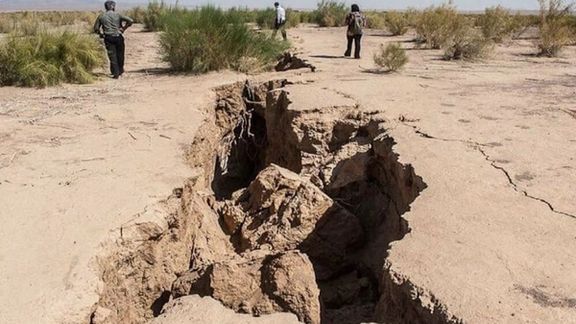
An expert in Iran has warned that the country has less than ten years to deal with dangerous land subsidence because of over-extraction of ground water.

An expert in Iran has warned that the country has less than ten years to deal with dangerous land subsidence because of over-extraction of ground water.
Reports and images last week showed that international airport and historic buildings in Esfahan are sustaining damage from sinking land, as a result of over-reliance on ground water for agriculture amid recurring droughts.
Ali Baytollahi, an expert on roads and buildings, told Tejarat News that most plains in Iran are sinking and the problem is worse in Esfahan.
Land subsidence is not limited to Esfahan and its surrounding plain. In many other areas in Iran cracks and huge hollows that resemble meteor craters have appeared in the ground in recent years. Ali Saberi, a geologist told local media recently that one million hectares of land in the country is affected by subsidence and the main cause is unlimited extraction of ground water.
Alireza Shahidi, head of Iran’s Geological Organization said earlier this year that land subsidence is a “disaster” and a “silent earthquake” that can lead to political and security crises.
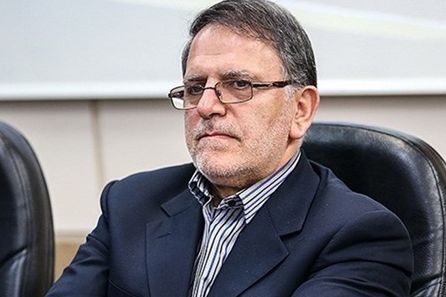
A former governor of the Central Bank of Iran (CBI) has been sentenced to 10 years in prison, along with several others, the Judiciary announced on Saturday.
Valiollah Seif headed the CBI from 2013 to 2018, during the first six years of Hassan Rouhani’s presidency but was accused of improper foreign currency transactions together with one his deputies, Ahmad Araghchi, nephew of Iran’s former chief nuclear negotiator, Abbas Araghchi.
The spokesman of the notorious Judiciary, which combines both prosecutorial and court functions, said that Ahmad Araghchi was sentenced to 8 years. The charges were improperly selling160 million US dollars and 20 million euros on the open market.
Another person charged in the case is Salar Aghakhani, a foreign currency dealer for Ansar Bank of the Revolutionary Guard Cooperatives Foundation.
Ahmad Araghchi in his defense in 2018 had said that the sale of hard currencies took place for boosting the value of the Iranian currency, rial, in coordination with the Intelligence Ministry and based on a request by the Supreme National Security Council and orders by president Rouhani.
Iran’s central bank routinely intervenes in the volatile foreign currency market, usually to defend the ever falling value of the rial.
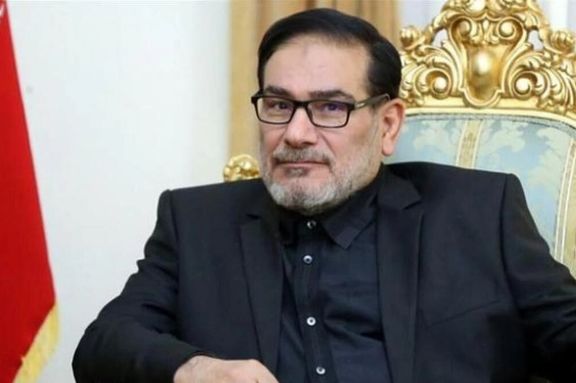
Ali Shamkhani, Iran’s top security official, warned Azerbaijan to avoid "costly traps set by devils" after President Ilham Aliyev accused Iran and Armenia of colluding in drug trafficking.
“Accusation against a country that the world recognizes as a hero in the fight against drugs has no effect other than invalidating the speaker's words," Shamkhani tweeted Friday.
Mahmoud Abbaszadeh-Meshkini, spokesman for the parliamentary committee on national security and foreign policy, told Tasnim news agency Saturday that said Iran's efforts against drug trafficking were "unparalleled in the world” and that without Iranian efforts, in which thousands of security officers had died, Europe and the Caucasus would have been flooded with drugs. He said that Azerbaijan was acting again good neighborliness, with ill-wishers trying to harm relations between the two Muslim countries.
Addressing Friday a videoconference of the Commonwealth of Independent States (CIS) heads of state, Aliyev alleged that Iran and Armenia had used Nagorno-Karabakh, which was under Armenian control from 1994 until last year’s Azerbaijan-Armenia 44-day war, to transport drugs to Europe. Armenia and Azerbaijan remain technically at war after an uncertain ceasefire.
Aliyev said Azerbaijan had shut down this drug-trafficking route, through Jabrayil region bordering Iran, after taking over the disputed territory of Nagorno-Karabakh last year and "restoring the [Azeri] 130-km border with Iran.” He also claimed that the volume of heroin his country had seized in other areas of the Azerbaijani-Iranian border had doubled since Baku took over Nagorno-Karabakh.
Prime Minister Nikol Pashinyan told the CIS that law enforcement bodies of Armenia and Iran were in close cooperation against drug trafficking. "I can also present numbers which demonstrate that the volume of seized drugs and the number of arrests in illegal drug trafficking cases have grown by three, four and even more times,” he said.
Tensions between Iran and Azerbaijan in recent weeks have seen Azerbaijan arrest Iranian truck drivers travelling to Armenia in a segment of territory under its control, and military drills on both sides of the border.Tehran is wary of potential geopolitical changes, the reported presence of Sunni fighters brought by Turkey from Syria to fight alongside Azerbaijani forces, and Baku allegedly opening its airspace to Israeli military flights.Baku freed the truck drivers Wednesday.
The United Nations Office on Drugs and Crime describes the trafficking of illicit Afghan opiates as “one of the world's greatest transnational drug and crime threats.”
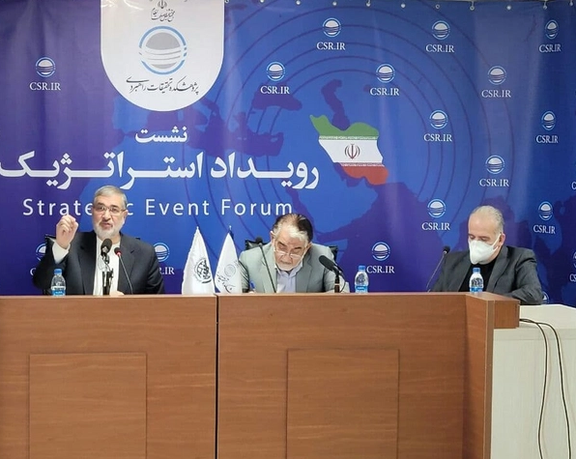
A roundtable discussion in Tehran has revealed two different visions about the economic future of Iran - improved ties with the world or reliance on the East.
Two local research institutes jointly sponsored a mini conference about economic diplomacy, which mainly revolved around the merits of the current emphasis by Iran on expanding ties with China and Russia to save its economy from crisis and a subtle rebuttal by one of the speakers.
At the two ends of the spectrum, a former ambassador to South Africa and former deputy oil minister Asghar Ebrahimi-Asl defended the strategy of relying on East, while the head of the Iran-China chamber of commerce Majid Reza Hariri spoke about the importance of foreign investments and strong ties with all economic powers.
Ebrahimi-Asl, who is a petroleum engineer reportedly with an MS degree from the University of Southern California (USC), criticized what he said was the policy of the former Rouhani administration in trying to improve ties with Europe and the United States. He was referring to nuclear negotiations with world powers that resulted in the 2015 nuclear deal later abandoned by former US president Donald Trump and the imposition of harsh sanctions.
Ebrahimi-Asl argued for Iran’s self-reliance, echoing arguments by Principlists and hardliners who follow Supreme Leader Ali Khamenei’s dictum. The former deputy oil minister insisted that fossil fuels will remain important well into the next decades and Iran has plenty of oil and gas reserves it can rely on. He also defended the view that the US is not a reliable country and will continue to plot against Iran.
Clearly, Ebrahimi-Asl said, the United States has faced defeats and failures while countries in the East and members of BRICS have become economic powers that Iran can rely on.
Majid Reza Hariri, with carefully observing the redlines of the Islamic Republic in public discourse, tried to put the emphasis on the acute need for foreign investments, which need good relations with the rest of the world.
First, he argued that the recent media and official emphasis on ‘economic diplomacy’ to boost trade suffers from a lack of clear definition. Iran’s decision makers should clarify what the term economic diplomacy means.
Hariri said that Iran chooses military influence in the region over influence in commerce with countries such as Iraq, Syria and Lebanon, but economic power is another important factor in strengthening national security.
The head of the China chamber of commerce implicitly referred to Iran’s policies which encouraged self-isolation after the 1980s Iran-Iraq war and said that if foreign companies had come and stayed in Iran and invested, it would have been much harder for others to impose sanctions on the country.
Hariri also drew attention to capital flight from Iran. He said capital that has left the country is three times more than foreign investments in the past three decades. He argued that state entities and three consecutive presidents since 1997 have failed to reach their targets in industrial development and expansion.
Hariri’s remark means that he is pinpointing inherent and systemic problems with Iran’s economic vision and policies, even before serious sanctions were imposed first by the United Nations from 2011-2015 and then by the US in 2018.
Hariri, at the end, emphasized the importance of economic ties with China but he also highlighted Iran’s favorable geo-economic position in the Persian Gulf and the Sea of Oman and argued for the country to expand on commerce and serve as an international commercial hub.
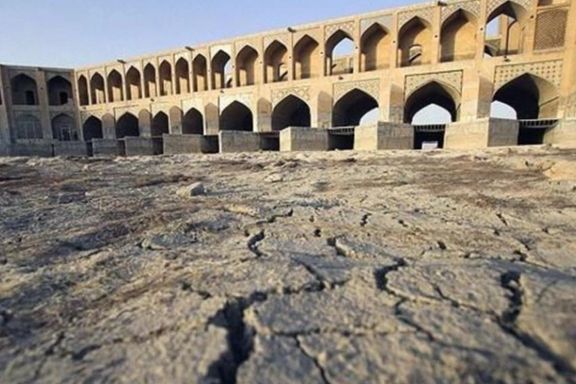
Farmers in Esfahan entered the office of a lawmaker and demanded he deliver on his promise of prayers for rain, saying they would not leave until it rains.
Iranian media published a video of the farmers sitting in the office Hossein Mirzaei a cleric and a member of parliament representing a district of Esfahan. Mirzaei had earlier said that special prayers for rain could help alleviate drought in the province. Farmers who have long blamed the government for mismanaging water resources decided to stage a protest.
Farmers around the ancient city of Esfahan have been protesting since 2017 for lack of irrigation water that has been diverted by the government to the neighboring Yazd province. These protests at times have been rowdy but so far authorities have failed to solve the problem.
During the sit-in at the lawmaker’s office, the farmers said they will wait until he shows up and prays for rain and will leave only when it rains.
The Islamic Republic newspaper wrote, “This gathering is in reality a protest to those who instead of taking practical steps to solve problems, invite the people to pray.”
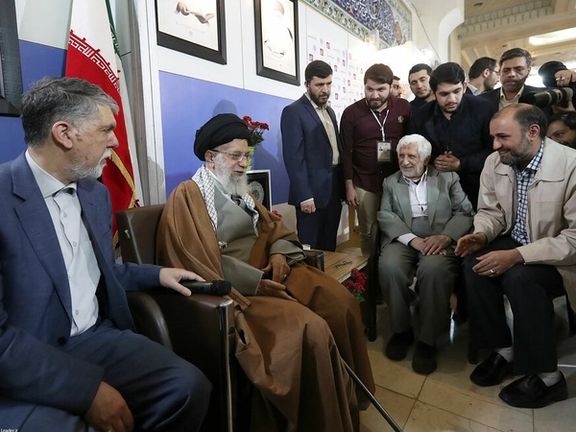
The new head of the Revolutionary Guard’s Media Basij Organization, a propaganda outfit, says Supreme Leader Ali Khamenei is not happy with the media in Iran.
Abbas Mohammadian, who was appointed to the post by IRGC Commander Hossein Salami earlier this week, has told the media in Tehran on Friday that his organization, the Media Basij, will strive to direct the media in a way that they would explain the Islamic Republic's underlying theme of Velayat-e Faqih, (Guardianship of the Jurisconsult), or the principle of Supreme Leader’s legitimacy to the people.
Basij is IRGC's paramilitary force, and its members are embedded in all government offices, industrial entities and social institutions to uphold and reinforce the regime's authority. The organization maintains 144 battalions whose job is to help shore up the regime’s authority among the public.
Mohammadian explained that Khamenei believes "the media have forgotten spirituality," and is unhappy because they have not met his expectations. Mohammadian reiterated that the media have done very little in explaining the virtues of the Supreme Leader to the people.
He went on to say that this is a matter to be followed up by the Culture Ministry. Recently, Culture MinisterMohammad Mehdi Esmaili announced an extensive plan to restructure the state media system to make it more consistent with the hardline nature of the governing Islamic system.
Morteza Kazemain, a journalist in London, told Iran International TV Friday morning that Khamenei's unhappiness about the media reflects his interest in consolidating his authoritarian rule. Kazemian added that the IRGC uses the Media Basij to convince the people about the regime's authority and to spread disinformation to serve the regime's interests.
Kazemian further said that thousands of Media Basij members all over Iran create content on social media to counter news and information dissemination by other traditional and social media outlets including foreign-based news organizations.
An indication of Khamenei's unhappiness with the media is that he did not extend the mandate of former state TV chief Abdolali Ali Askari after his first five years, and the director before him, Mohammad Sarafraz wrote in his memoir that he had to resign his post after only two years as the IRGC intervened in his responsibilities.
Meanwhile, as Kazemian pointed out, Khamenei has always had a negative attitude toward the media. He has not had any interviews with the press or his own state TV during the 32 years he has been Iran's Supreme Leader.
According to several polls conducted by state-owned polling agencies, the state television's popularity has been constantly dropping during the past years, particularly in the past three years when the state TV lost another 15 percent of its viewers.
At the same time, as Ensaf News website observed, the daily readership of Iranian newspapers has plummeted dramatically during the past two years, declining to as little as 1,000-3,000 copies for flagship dailies. The papers contested the website's report not because it was not true, but because they keep pretending to have a high readership to get more subsidies from the government.
Censorship and government control has not left anything interesting in the press. Readers, instead turn to social media where some of the platforms are highly popular. Instagram has over 22 million users and Telegram has more than 45 million users according to government officials. This is probably the reason why the Iranian government is so adamant to block access to social media such as Facebook and You Tube.